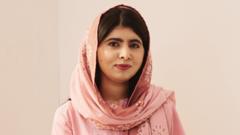Malala Yousafzai, the renowned advocate for women's rights and youngest Nobel Peace Prize laureate, is once again raising concerns about the rapid erosion of women's rights in Afghanistan under Taliban rule. After being a target of a Taliban attack in 2012, Malala has remained a fierce advocate for gender equality, and now she is lending her voice to highlight the struggles faced by women and girls in Afghanistan, where an oppressive regime has imposed severe restrictions.
Reflecting on the situation, Malala shared with BBC Asian Network, “I never imagined that the rights of women would be compromised so easily.” With the Taliban having regained control as of 2021, the oppressive "morality laws" have stripped away numerous rights from women, mandating strict dress codes and prohibiting them from traveling without a male chaperone. The UN refers to this systematic crackdown on women's rights as "gender apartheid," a term that emphasizes the acute discrimination faced by women in Afghan society.
Describing the grim realities, Malala notes that many young girls are finding themselves in a "hopeless, depressing situation," where they cannot envision a brighter future. This alarming trend has seen more than a million girls barred from school since the Taliban's takeover, representing approximately 80% of female students in the country. Reports from human rights organizations indicate a troubling correlation between the loss of educational opportunities for women and a rise in child marriages as well as maternal health crises.
In response to these injustices, Malala has taken on the role of executive producer for the upcoming documentary "Bread & Roses," which follows the lives of three Afghan women whose rights have been stripped away. The film provides a narrative of the challenges faced by women like Zahra, a dentist forced to abandon her practice, activist Taranom, who escapes to the border, and government worker Sharifa, who loses her job and autonomy. As Malala emphasizes, the film is not just about the stories of these three women, but represents the voice of the approximately 20 million Afghan women facing similar oppression.
Directed by Afghan filmmaker Sahra Mani, the film also features involvement from American actress Jennifer Lawrence. Sahra, who managed to flee Afghanistan after the US-backed government's collapse, has worked tirelessly to document the struggles faced by Afghan women. Through personal video footage collected from women back home, Sahra underscores the importance of sharing their stories with the world.
The documentary also sheds light on the courageous resistance exhibited by women in Afghanistan. Despite the grim realities they face, Malala asserts that these women continue to rise and fight for their rights, stating, “They're putting so much at risk. It's our time to be their sisters and be their supporters."
As "Bread & Roses" gears up for its global streaming premiere on Apple TV+ on November 22, both Malala and Sahra express hope that the film will galvanize international attention and instigate compelling action to restore women's rights in Afghanistan. Malala powerfully insists, “If they are not scared, if they are not losing that courage to stand up to the Taliban, we should learn from them and we should stand in solidarity with them.”
While the film chronicles a story of loss and oppression, it ultimately champions resilience and hope—a message that resonates with anyone advocating for human rights worldwide.


















